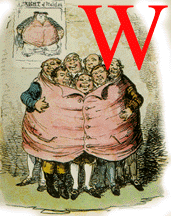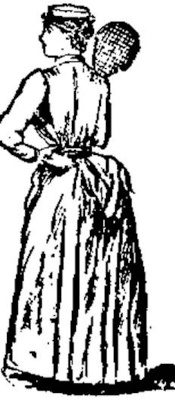This article has been transcribed from a copy of the Cardiff Times in the online collection of scanned Welsh newspapers 1804-1919 in the National Library of Wales, with grateful recognition of the free access accorded to all readers. Paragraph breaks have been introduced for easier reading. George Cruikshank created the decorated initial letter.
This article addresses the interests of the relatively well-off, and is perhaps not ideally suited to the newspaper in which it appears. When Samuel writes of 'aristocratic people' he is probably being ironic, and is thinking of middle-class people who consider themselves better than those around them. When he takes 'A as the start of the alphabet he is joking at the expenses (mainly) of Londoners. A web search reveals that some teachers of elocution still use a Victorian rhyme on the phonetic theme of 'Appy 'Amstead, in order, as cockneys used to say in provocative response, 'to learn their pupils to talk proper'. A popular rhyme goes as follows:
'Arry went to 'amstead, and 'arry lost is 'at. Arry's mother said to 'arry, ' 'arry,where’s your 'at? 'Anging on the 'anger in the 'all, Ma.'
The caption to the second illustration is curious. From a flag in the background the walker appears, to be on a golf-course, although his club is rather short, but no more out of proportion than any other part of him or his accoutrements.
Railways novels were published or reprinted for sale on railways stations, and were often associated with the name of W.H. Smith, who held the monopoly of book sales on railway stations in England (though not in Scotland) after 1848. The term is usually at least mildly derogatory.
References
‘fresh fields and pastures new’: a frequent, almost proverbial, misquotation of Milton’s ‘Lycidas’ l. 193:'Tomorrow to fresh woods, and pastures new.'
'bells pealing over the lea as the cattle plod their homeward way' is a loose paraphrase of the opening lines of Thomas Grey’s 'Elegy Written in a Country Churchyard' (1751):
The curfew tolls the knell of parting day, The lowing herd wind slowly o'er the lea, The ploughman homeward plods his weary way.
'far from the madding crowd' is from the same poem (l. 73). Thomas Hardy's Far from the Madding Crowd had been published in 1874.
'There's nothing half so sweet in life / As a fortnight's rest' is joke on Thomas Moore (1779-1852), 'Love’s Young Dream', ll. 10-11:
… there’s nothing half so sweet in life, As love’s young dream'
'summer madness': there seems to be no reference to a specific song or poem
The four lines quoted at the end of the article are from 'Bohemia’s Land. A Song of the Season', by Clement Scott (1841-1904), English journalist and theatre critic. —— David Skilton

here are you going for your holidays? 'Don't know; haven't quite decided yet.' This question and answer are, at this period of the year, heard almost every day, for it is at this time that people generally begin to wish for a change and feel a desire for fresh fields and pastures new. They want to get away from the humdrum or exciting life they have led since their last holiday, and to leave behind them their cares and their business for such Iength of time as circumstances permit. They have come to the end of their working tether, and want to enjoy the delicious luxury of perfect idleness.

Clerical holiday maker
There are many people who have no idea of the real delights to be obtained from a state of dolce far niente [sweet idleness]. I once heard the head-master of a well-known grammar school say, in reply to a question as to his idea of a perfect holiday, that he liked nothing better than to 'lie on his back and bask in the sunshine.' And those who have in the summer-time tried the experiment will endorse his opinion. To lie at ease and dream away the hours in an absolute state of laziness is far more of a holiday than the regulation trips so popular with the masses, who, for the most part, know nothing of the Elysium of a 'summer madness,' which resolves itself into weaving fancies in the sunlight, and stacking the pipe of peace, in an old and unweeded country garden, when the sweet glow throws its rainbow tints on the surrounding landscape and glints on the spire of some old church whose very appearance and surroundings are redolent of peace and quiet. There is a delightful drowsiness about the very atmosphere, the birds seem to rest more frequently than elsewhere, and the bells pealing over the lea as the cattle plod their homeward way[i] seem laden with suggestions of perpetual rest. But whatever difference of opinion may exist as to the best way to spend a holiday, there are few who do not share the belief that, to misquote the poet,
There's nothing half so sweet in life
As a fortnight's rest.

Pedestrianiser.
Let us take a brief survey of the manners and customs of the general run of humanity when it is out for its annual holiday. To begin at the beginning of the alphabet, we find that the most caricatured and sneered at holiday makers are those residents of the great city popularly known as 'Arry and Arriet,' who are generally supposed to revel in the delights of '’Appy ’Amstead' or to find the perfection of enjoyment in a week at Margate. Whether they obtain rest from their stay at Margate or invigoration from ’Appy ’Amstead' may be doubted, but that they obtain a certain kind of rough enjoyment is indisputable. As beauty is supposed to be dependent on the eyes of the beholder, so enjoyment is dependent on the constitution of the individual. What is enjoyment to 'Arry would be purgatory to the scholar. Young people, whilst drawing the line at the boisterous enjoyment of 'Arry and 'Arriet, generally like to make their holidays as lively as they can, and sea-side resorts are their favourite hunting grounds. You find them in abundance at Bridlington, Blackpool, and the Isle of Man. They go in for what; they call fun, and do as much real hard work in a day as they do in a week at home. After the day's enjoyment is over they repair to the various boarding-houses and continue the fun inside, with the result that they retire to rest tired out. I have known specimens of this type of holiday-maker go to a favourite haunt for a fortnight, and then come in such a state as to necessitate a three weeks' recuperating trip to some less lively district. Yet were you to insinuate that they did not know how to enjoy a holiday they would laugh at. you. If it be true that change is rest they ought to be thoroughly rested, for they not only get change of scene but they entirely alter -- for a fortnight — their lives and habits.

Takes his holidays on wheels.
Aristocratic people choose their holiday haunts according to the caprice of fashion, one year perhaps going to Aberystwyth and the next, to Llandudno or Ilfracombe, but wherever they pitch their tents their modus operandi [way of going about it] is much the same.
They are seldom to be seen at any resort that has not a saloon and a band, for it is upon this regulation promenade that they desport themselves morning and evening. It is the saloon parade that enables the daughters of society and their maternal relatives to show off their holiday frocks, hats, and sunshades to the delight of themselves and the envy of their less fortunate sisters. This process is carried on morning and evening, the afternoon being generally devoted to sleeping or -- very occasionally — driving. Society has an objection to turning out in the afternoon when away for its holiday. Sleep is necessary for the presentation of the, good looks of the ladies -- knocked up by a London season, and the male representatives find it 'too much fag' to turn out. Thus they go the rounds day after day, and pull themselves together for the remainder of the year, for holiday-making the society is ai often as not a process of repairing damaged constitutions. Those denizens of the world where the créme de la créme [sic] reside who g[o] abroad when their friends stay at home are usually supposed to do more from motives of economy than choice. A holiday to them is a necessity from other points of view than those of health and rest.

Holiday tennis.
Paterfamilias with a middle-class position and a sprinkling of olive branches usually hies him with his belongings to some quiet inexpensive seaside place where his youngsters can inhale an unlimited quantity of ozone, and where he can sit on the rocks and smoke while his better-half does needlework or revels in the contents of a railway novel. These good people are not, as a rule, folks of many ideas, and they get more real value out of their annual vacation than the racketing youngster or the Society swells.
Some sprinkling there has been of late from all the above types who have gone in for a big rush to the Norwegian fj[i]ords, which they explore at the most rapid rate possible. They come back with marvellous stories of their experiences, and impress upon all their friends and acquaintances the vital importance of their starting for Norway at the earliest possible moment.
If you want hurrying out of your life, take their advice; if you want a rest, do not.
There are no people who appreciate and enjoy a holiday so thoroughly as the tired brain-workers. They know the value of rest to an extent undreamed of by the ordinary holiday-makers. They do not go off on frisky excursions, nor do they go to the latest fashionable resort of society. No, they go to some quiet spot far from the madding crowd, and there amid pleasant and peaceful surroundings they revive their worn-out energies. To them the country in its summer garments is a perfect paradise — the flowers have a sweeter odour than elsewhere, and the atmosphere seems filled with a sense of repose. They return to their labours (and there is no such tiring labour as brain-work) like giants refreshed prepared to do their utmost to enlighten or assist their fellows. Now for a parting word to the holiday-makers generally. If you want to get some meed of value from your holidays do not select a spot where the genus racketeer is to be found. His presence mars the prettiest of scenery, and his modus operandi is opposed to the rational method of taking a rest.
If you are thoroughly tired out take my advice and select some quiet country village where the world you live in is a thing of hearsay only. Nature unadulterated is the best remedy for over-work, and the versifier who said –
To the fields! for nature presses
On toiling foreheads a balmy kiss,
There’s nothing so sweat as her wild caresses,
No love more full to the lips than this.
[k]new the value of the-rest and knew also where to find it.
Last modified 9 April 2022